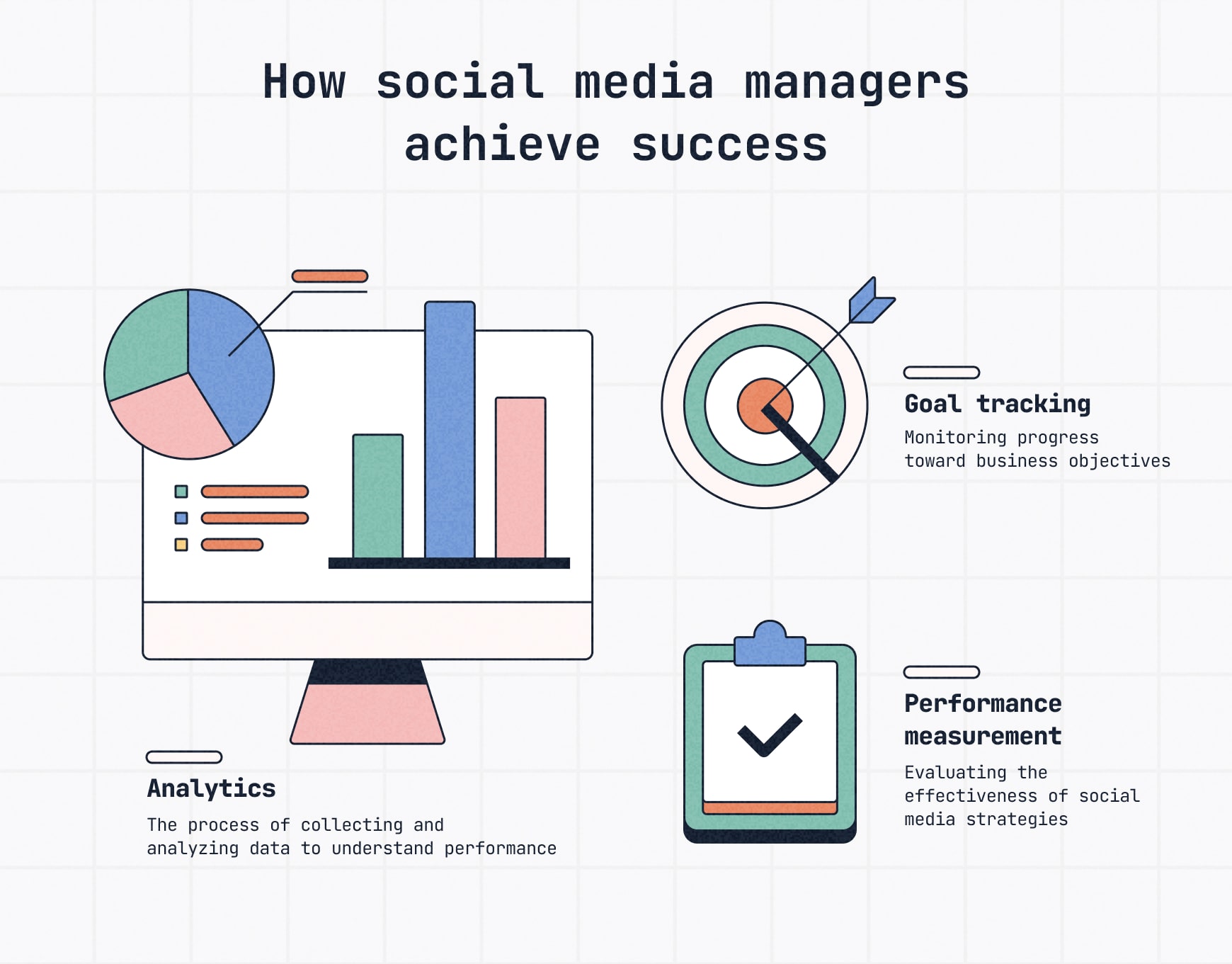Slaying it on the socials isn’t just about tossing some posts out there and hoping for the best.
A skilled social media manager can make or break your company’s online presence.
From content creation and community engagement to analytics and paid advertising, the role requires the wearing of many hats, blending creativity, strategy and technical expertise. Which is why it’s a tough hire.
This guide gives you the structured interview framework you need to help identify the best social media manager for your brand. We’ll cover key questions (and the answers to look for) across key areas so you’re equipped to hire the right pro to upgrade your social media presence.
Key takeaways
- A great social media manager must blend creativity with strategic thinking to create engaging content and foster community engagement.
- Essential skills for success include adaptability to trends, data-driven decision-making and strong analytical abilities to measure campaign effectiveness.
- Collaboration with other departments and effective use of social media management tools are key for optimizing social media strategies and enhancing brand visibility.
🎬 Learn what Slickplan can do!
We filmed a short video to show you exactly how to use Slickplan
Understanding what makes a great social media manager

Hiring the right social media manager can be challenging. Lots of businesses struggle to evaluate a candidate’s ability to drive engagement, manage crises and deliver measurable results.
So before diving into social media manager interview questions, we have to define what makes a strong social media manager. Beyond simply posting, they need a bushel of other talents.
- Content strategy & creation — Communication skills to craft content tailored to different social media platforms, project management and staying up on the latest trends.
- Community engagement & brand voice — Building and nurturing a loyal online community while maintaining your brand’s voice.
- Analytics & performance measurement — Using data-driven insights and tracking relevant metrics to meet social media goals and refine strategy.
- Paid social advertising — Running targeted social media campaigns to drive conversions and brand awareness.
- Crisis management & reputation handling— Responding to PR challenges in real-time with strong crisis management skills.
- SEO & cross-platform integration — Ensuring content is optimized for search and consistent across various social media platforms (social doesn’t have a direct effect on search but SEO optimized content that sends people to your site can absolutely climb the search pages, so there is a relationship between SEO and content marketing).
A resume may list impressive achievements, but how do you uncover the real skills behind the bullet points?
29 essential questions to ask a social media manager by category

Knowing what to ask is one thing, understanding why to ask and what to expect from the answer is another.
That’s what you’ll find here. On top of that, we separated the interview questions for social media coordinator into categories so you can get to know your next social media guru in the areas that matter most
- Strategy and content creation
- Engagement and community management
- Analytics and performance measurement
- Paid advertising & ROI
- Crisis management and reputation handling
- Tools and technologies
Keep in mind there’s no objectively right or wrong answer to these social media manager job interview questions, only what’s right or wrong for you.
Strategy and content creation

First and foremost, social media managers need to be able to both create content and build a strategy to maximize the reach and effectiveness of that content.
After you get past the pleasantries and softball questions like asking what their favorite social media platform is, jump into the meat and potatoes.
1. "Can you walk us through your process for developing a social media strategy for a new brand?"
Why it matters: A strong strategy is a must for long-term success. This question helps assess the candidate’s ability to research, plan and implement a tailored strategy.
Sample answer: "I start by analyzing the brand’s target audience, industry trends and competitor strategies.
Then, I outline key objectives, select the appropriate social media platforms and create a social media calendar that balances organic and paid efforts while ensuring we regularly publish content.
I also ensure alignment with broader business goals and track success using key performance indicators."
2. "What social media trends do you think will be most important this year?"
Why it matters: Staying ahead of trends is crucial for relevance and engagement in social media marketing. Cringey, off-trend content can make you seem out of touch. Not good.
Sample answer: "Some of the latest social media trends include short-form video, influencer marketing and AI-driven content personalization.
On top of that, brands are focusing on community-driven interactions and leveraging multiple social media platforms for a cohesive strategy."
3. "How do you tailor content for different platforms (Facebook, LinkedIn, TikTok, Instagram, etc.)?"
Why it matters: Each platform requires a different approach to maximize reach and engagement.
Sample answer: "Each social media platform caters to a unique audience. For LinkedIn, I’d keep content more professional and leverage the personal social media platforms of leadership to connect with your audience, while on TikTok I’d go with punchy, creative videos. The content’s tone, format and messaging would be adjusted to fit each platform’s strengths while maintaining a consistent voice"
4. "What is your approach to brand voice and storytelling on social media?"
Why it matters: A consistent tone of voice for your brand ensures a strong, recognizable identity across platforms.
Sample answer: "I develop a brand voice by aligning content with company values and audience preferences. Storytelling plays a big role—I aim to create narratives that resonate emotionally while ensuring consistency across all social media channels."
5. "How do you balance organic content with paid promotions?"
Why it matters: A mix of organic and paid strategies ensures sustainable growth and consistency in reaching your audience.
Sample answer: "Organic content builds credibility and long-term engagement, while paid promotions help amplify reach. I’d start by analyzing your past performance to determine which posts to boost and reallocate the social media budget efficiently to maximize return on ad spend (ROAS)."
Engagement and community management

The goal of social shouldn’t simply be to push products and services, this avenue of digital communication is all about engagement and connection.
The manager you hire should be a community builder, fostering connection and creating “fans” of your brand.
6. "How do you make sure a brand remains authentic while engaging with its audience?"
Why it matters: Authenticity builds trust and strengthens long-term relationships.
Sample answer: "I maintain authenticity by ensuring our messaging reflects company culture and values.
Engaging genuinely and personally with followers, responding to feedback and avoiding overly promotional content help foster trust. My goal is to create loyalty and excitement around what we do."
7. "What strategies do you use to increase engagement rates across social platforms?"
Why it matters: Engagement is key to building a loyal and active community.
Sample Answer: "I encourage audience interaction by using polls, live Q—As and user-generated content to build trust. Additionally, I analyze engagement metrics to determine which types of posts resonate most with our target audiences."
8. "How do you handle negative comments or a social media crisis?"
Why it matters: Fires happen all the time online, having someone who knows how to put them out is crucial for protecting your brand’s reputation.
Sample Answer: "I respond to negative feedback promptly and professionally. If necessary, I escalate serious issues internally.
During a social media crisis, I follow a pre-planned crisis response plan that includes assessing the situation, addressing concerns transparently and taking steps to prevent future issues."
9. "Can you share a time when you successfully turned around a negative interaction?"
Why it matters: This shows problem-solving skills gained from personal experience and an ability to handle sensitive situations.
Sample answer: "When working with a previous employer, a customer left a negative review about a delayed delivery time on something they’d ordered. Because I had a plan in place beforehand that was approved by management, I was able to quickly reach out directly, apologize and give them a discount for their inconvenience.
Not only did the customer update their review positively, but they also became a loyal advocate for the brand."
10. "What’s your approach to influencer collaborations and partnerships?"
Why it matters: Regardless of how people feel about influencers, they’re here to stay. Not only that, they’re an effective way to expand reach and credibility.
Sample answer: "First and foremost, I look for influencers who align with our brand’s voice and target audience. Collaborations should be authentic, with clear goals and performance tracking to measure success.
I constantly reassess the relationship and make sure we stay on the same page and out of trouble."
Analytics and performance measurement

To knock the ball out of the park, social media managers need to be able to track social media goals and adjust when it appears like they’re going to miss the mark.
Here are the social media marketing manager interview questions you’ll want to ask.
11. "Which social media metrics do you consider most important for measuring success?"
Why it matters: Identifying key performance indicators ensures a data-driven approach. Without this, your social media marketing is basically guesswork.
Sample answer: "Key metrics like engagement rates, reach, conversion rates and audience growth are crucial.
I use tools like Google Analytics to see how much traffic we’re getting via social and native platform insights to track these metrics to optimize our strategy accordingly."
12. "Can you provide an example of how you’ve used analytics to optimize a social media campaign?"
Why it matters: Understanding data is crucial. Using that data for refining social media strategies is even more important.
Sample Answer: "In my last role, I noticed a decline in engagement rates. After analyzing the data, I discovered that quick, snappy video content performed best but we were all in on text and GIFs.
I shifted the strategy of our social media team to include more video posts, leading to a 40% increase in engagement over three months."
13. "How do you report on social media performance to stakeholders?"
Why it matters: Communicating results effectively is key to aligning with business goals. The last thing you want is a mess of stats you can’t easily understand or, worse, no reporting at all.
Sample answer: "I create detailed performance reports that highlight key metrics, campaign insights and ROI.
I present these in an easy-to-understand, 1-page format along with actionable recommendations for future moves and strategies."
14. "What tools do you use for tracking social media performance?"
Why it matters: Proficiency with analytics tools ensures accurate measurement and reporting.
Sample Answer: "I regularly use Google Analytics, Hootsuite, Sprout Social, and native platform insights from Facebook, Instagram, and LinkedIn to track social media performance."
15. "How do you set realistic but ambitious social media growth targets?"
Why it matters: Growth targets help align social media efforts with business objectives. You want someone who’s essentially both a realist and an optimist.
Sample answer: "I set growth targets based on past performance, industry benchmarks and business goals.
To keep things realistic, I use the SMART framework and put together Specific, Measurable, Achievable, Relevant and Time-bound goals to keep teams focused and motivated."
Paid advertising &ROI

Being great at the organic avenue of social matters quite a bit but you want to find someone who can couple that with paid advertising to effectively extend your reach even further.
Ask these social media management interview questions to find out if they know their stuff in terms of paid.
16. "What experience do you have with paid social media advertising?"
Why it matters: Paid ads require strategic thinking to maximize ROI.
Sample answer: "I have experience running paid campaigns across Facebook, Instagram and LinkedIn. I focus on targeting the right audience, A/B testing things like text, image, CTAs and more to optimize ad spend for maximum conversions."
17. "How do you determine the best platform for running paid social ads?"
Why it matters: Different platforms offer varying audience demographics and engagement levels. Think of it this way, the people looking for retirement planning services and those looking for bikinis are not necessarily on the same platforms.
Sample answer: "I analyze where your brand’s target audience is most active and which platforms align with campaign goals. For B2B brands, LinkedIn is ideal, while Instagram and Facebook work well for consumer-focused products."
18. "What’s your approach to A/B testing in social media campaigns?"
Why it matters: Testing different strategies helps optimize ad performance.
Sample answer: "I test different ad creatives, copy and targeting segments. By analyzing performance metrics, I can determine which variations drive the best engagement and adjust future campaigns to maximize the company’s social media strategy."
19. "How do you measure and optimize return on ad spend (ROAS)?"
Why it matters: Effective ad spending ensures maximum impact on the budget.
Sample answer: "I track ROAS by comparing revenue generated from ads to the total ad spend. I optimize by refining targeting, adjusting bid strategies and reallocating budget to high-performing campaigns."
20. "Can you share an example of a successful paid campaign you’ve managed?"
Why it matters: Demonstrates practical, real-world experience in managing paid social campaigns.
Sample Answer: "I managed a Facebook campaign for a product launch that generated a 5x ROAS. We targeted a lookalike audience, optimized the creative and used retargeting ads to boost conversions."
Crisis management and reputation handling

Bad $#!t and the internet are like two peas in a pod.
If you’re operating online long enough there’s a chance you’ll rub people the wrong way. When it’s your company that’s rubbing your clients, prospects and buyers the wrong way…well, that’s a crisis.
Make sure your social media manager interview questions cover that.
21. "Tell me about a time when you had to manage a social media crisis. How did you handle it?"
Why it matters: It’s not all rainbows and sunshine in social media land. A good social media manager is going to need crisis response skills to protect your brand.
Sample answer: "When a negative news article about our company started trending, I acted quickly by issuing a transparent statement, engaging with concerned users and shifting the conversation toward positive company initiatives. I’ve found that handling problems head-on with a fast, honest response has always served myself and my clients well."
22. "What are the key steps in a social media crisis response plan?"
Why it matters : Social media managers should have a structured approach to minimize brand damage. A pre-planned and coordinated response, that’s easy to activate when a major issue crops up.
Sample answer: "A crisis plan should include monitoring brand mentions, assessing the situation, crafting an appropriate response and engaging with the audience transparently.
Importantly, I make sure all relevant parties in the company know the plan, from the marketing team up to management. Post-crisis, I analyze lessons learned to prevent future issues."
23. "How would you handle an unexpected controversy involving the brand?"
Why it matters: This shows adaptability, thinking on their toes and crisis management skills in action.
Sample Answer: "I’d act quickly to first understand what happened and the cause, then issue a crystal clear and professional response while also communicating with internal teams to align messaging.
Transparency and timely updates help rebuild trust."
24. "What steps do you take to monitor brand reputation online?"
Why it matters: Proactive reputation monitoring helps prevent crises and is an often overlooked part of a social media manager’s job.
Sample answer: "I use tools like Google Alerts and Sprout Social as well as social listening platforms like Brandwatch to track brand mentions, sentiment and emerging issues and actively avoid a brand reputation crisis."
25. "If a viral post misrepresented your brand, how would you respond?"
Why it matters: Demonstrates ability to manage misinformation effectively.
Sample Answer: "I would put out an immediate clarification, engage constructively with users and make our company’s side of the story accurately represented."
Tools and technologies

The right tools and technologies are a must for effective social media management.
Social media tools like Buffer, Sprout Social, Later, Meta’s Business Suite and many, many others help streamline the process of managing social media channels, improving engagement and analyzing performance metrics.
Effectively using these tools makes strategic planning and execution of social media projects more efficient and, importantly, helps overall return on investment (ROI) in campaigns.
26. "Which social media tools are you familiar with?"
Why it matters: Candidates have to be well-versed in the tools of the trade to streamline content scheduling, track analytics and manage engagement efficiently. Look for mentions of things like Hootsuite, Buffer, Sprout Social and Meta’s Business Suite, for example.
Sample Answer: "I have a lot of experience with HubSpot for managing multiple social media accounts, amazing for my mental health, plus Buffer for scheduling.
I also use Google Analytics to track website traffic from social channels and take advantage of Canva for quick content creation."
27. "How do you schedule social media posts?"
Why it matters: Scheduling ensures consistent content delivery, maximizes engagement and optimizes content workflow. Candidates should describe their strategy for planning and scheduling posts, including the tools they use.
Sample Answer: "I use Hootsuite, SocialBee, and Later to schedule posts, optimizing performance based on audience engagement data.
SocialBee is great for balancing scheduling and collaboration when working with small teams, and its AI tools help streamline content planning.
I analyze insights from each platform to determine the best posting times, ensuring a steady flow of content. Additionally, I maintain a content calendar to align posts with campaigns and business goals."
28. "What tools do you use to track and analyze social media performance?"
Why it matters: Understanding performance data helps refine strategies and maximize ROI. Candidates should be familiar with analytics tools and how to leverage insights effectively.
Sample Answer : "I use Google Analytics, Meta Insights and Keyhole to monitor engagement, conversions and audience demographics.
These tools allow me to adjust content strategies, optimize ad spend and provide data-driven recommendations to management."
29. "How do you stay updated with emerging social media technologies?"
Why it matters: The social media landscape is constantly evolving. Consider that a few years ago nobody heard of TikTok, X was called Twitter and a couple decades before social media didn’t even exist! Staying ahead of social media developments, digital trends and new tools ensures continued success.
Sample Answer: "I’m a student of the social game. I regularly attend webinars, follow industry leaders on LinkedIn and X and actively engage in Reddit’s communities to stay up on what’s next.
I also test new tools in a controlled environment before integrating them into our broader social media strategy."
Conclusion
Finding the right social media manager is essential for growing your brand’s online presence and driving meaningful engagement.
By structuring your interview process around key competencies, strategic thinking and real-world scenarios, you can confidently ID the best candidate for the role.
A well-rounded social media manager will help elevate your brand, build strong audience relationships and deliver measurable results.
Just make sure you’re asking the right questions.
Plan smarter content with Slickplan
A collaborative workspace to handle all your content needs. Plan, gather and create together.
Frequently asked questions
What interview questions to ask a social media manager?
Ask about their social media strategy, content creation, analytics skills, crisis management and experience with paid campaigns. Also, behavioral questions can show you their problem-solving skills and ability to handle real-world scenarios effectively.
What skills should a social media manager know?
A social media manager should excel in content creation, analytics, community engagement, crisis management and paid advertising. They should also be on top of social media tools like Hootsuite, Buffer and Google Analytics while staying updated with industry trends.
How to nail a social media manager interview?
Demonstrate a strong understanding of social media strategies, showcase past successes with measurable results and discuss how you adapt to industry changes. Highlight your experience with analytics, engagement tactics and crisis management while confidently articulating your problem-solving approach.
How should interview questions for a social media manager be approached?
Focus on scenario-based and behavioral questions to evaluate problem-solving skills, adaptability, and strategic thinking. Ask about content strategy, audience engagement, analytics and paid campaigns to assess their comprehensive social media expertise.
What should a candidate demonstrate regarding their past experience during an interview?
Candidates should provide data-backed examples of successful campaigns, discuss challenges they've overcome and explain how their strategies improved engagement, conversions or brand awareness. Demonstrating adaptability and familiarity with various social platforms and tools is also key.






 X
X

